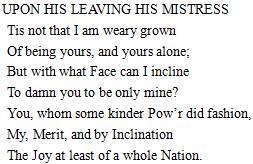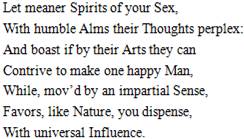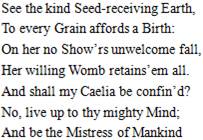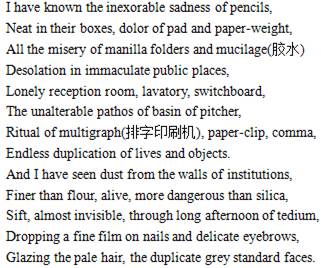考研真题
1. 北京大学外国语学院专业知识历年考研真题汇总(含部分答案)
2. 全国名校英美文学考研真题
考研指导书
1. 罗经国《新编英国文学选读》(第4版)笔记和考研真题
2. 罗经国《新编英国文学选读》(第4版)配套题库【考研真题精选+章节题库】
3. 常耀信《美国文学简史》(第3版)笔记和考研真题
4. 常耀信《美国文学简史》(第3版)配套题库【考研真题精选+章节题库】

北京大学外国语学院专业知识历年考研真题汇总(含部分答案)
书籍目录
2012年北京大学外国语学院专业知识考研真题及答案
2010年北京大学外国语学院专业知识考研真题(回忆版,不完整)
2009年北京大学外国语学院专业知识考研真题(回忆版,不完整)
2007年北京大学外国语学院专业知识考研真题

部分内容
2012年北京大学外国语学院专业知识考研真题及答案
考试科目:专业知识
招生专业:英语语言文学
研究方向:英语语言文学
说明:答题一律写在答题纸上(含填空题、选择题等客观题),写在此页上无效。
I. Please choose to answer
oneof the following two questions.(50)
1.Please comment on the following poem with particular attention to
its poetic elements, and then discuss those aspects of the poem that impress you
the most.
UPON
HIS LEAVING HIS MISTRSS



【答案】
This poem has three
stanzas and the rhyming scheme of each stanza is aabbccc, giving people a kind of
neat and orderly sense. The poet uses alliteration in this poem, which intensifies
the rhythm and meter of it, and examples as follows: “Let meaner Spirits of your
Sex”, “And
boast if by their Arts they can” and “Contrive to make one happy Man” and so on.
What’s more, the poet uses the capital form of some letters in a willful manner
so as to emphasize the points that he wants to stress, from which we can also figure
out the poet’s focuses and concerns.
There are several
aspects that impress me the most. First of all, I am impressed by the poet’s indignation,
which can be noticed from such lines as “But with what face can I incline / To damn
you to be only mine?” And then, I am impressed by the poet’s ironical and satirical
tone in this poem. The poet severely satirizes “his mistress’” flirtation, sappiness
and disloyalty. This kind of irony and satire run through the whole poem. Last but
not least, the poet’s suing of rhetorical question impresses me a lot, from which
we can easily be affected by the poet’s strong feelings and emotion.
2.The Restoration period is also known as the Age of Dryden because
he was not only the most important dramatist, poet and translator, but also the
founder of literary criticism in England. Please discuss and evaluate Dryden’s literary
and critical views with specific reference to 1 or 2of his works.
【答案】
The Restoration period
is also known as the Age of Dryden because he was not only the most important dramatist,
poet and translator, but also the founder of literary criticism in England. Please
discuss and evaluate Dryden’s literary and critical views with specific reference
to 1 or 2 of his works.
English literature
of the Restoration period was modeled on the literature of France where neoclassicism
was then prevailing. The neoclassicism upheld reason, law and order in literature
instead of the free expression of man’s individuality in the Renaissance. According
to neoclassicism, drama, poetry and prose should all be controlled by some fixed
rule. The English poets and writers of this period wrote under this influence. So
did Dryden. His subject-matter was often factual, and he aimed at expressing his
thoughts in the most precise and concentrated way possible. He established the heroic
couplet as a standard form of English poetry by writing successful satires, religious
pieces, fables, epigrams, compliments, prologues, and plays with it. He also introduced
alexandrine and triplet into the form.
Dryden’s works on
literary criticism are numerous and he has often been regarded as the earliest literary
critic of real importance. Especially, Dryden was known for his satirical verse,
which is written in heroic couplets, a verse form widely adopted by the poets of
the 18th century. He made his prose precise, concise and flexible, and
raised English literary criticism to a new level. All for Love, which
was written in 1678, was his most famous masterpiece based on Shakespeare’s famous
play Anthony and Cleopatra. He had mastered the art of comparative
criticism, using prose and dialogue for debate, and wit and satire to illustrate
disparities between church and state. His most famous prose composition is An
Essay of Dramatic Poesy, which established his position
as the leading critic of the day.
Dryden made a great
contribution to the English literature of Restoration period.
II. Please choose to answer
oneof the following three questions. (50)
1.The following stanzas are taken from William Wordsworth’s poem “Expostulation and
Reply,” discuss them. Show that you have an adequate grasp of the literal meaning
on the surface, and elaborate upon how they may relate to some Romantic ideas.



【答案】
The following stanzas
are taken from William
Wordsworth’s poem “Expostulation and Reply,” discuss them. Show that
you have an adequate grasp of the literal meaning on the surface, and elaborate
upon how they may relate to some Romantic ideas.
The poet tells his
friend that why he sits upon that grey stone and dreams away his time. His reason
is that by doing this he can gain power from nature and refresh his mind. And he
thinks that by contacting with nature, he can understand many things. Nature is
magical to him. At the same time, the poet focuses on himself and reflects on nature,
life and so on. He is lost in his own world of emotions and imaginations.
In Romanticism, individuals
and nature play great roles. Romanticism emphasizes the individual, the subjective,
the irrational, the imaginative, the personal, the spontaneous, the emotional, which
are often and fully embodied in Wordsworth’s poems, especially the nature, to which
he pays close attention. And from the above stanzas, we can see that Wordsworth
sits alone and dreams away so as to communicate with nature and free his imagination.
There is no reason, law, or order anymore, and his world becomes boundless.
Wordsworth was a
famous representative of romanticism school, and he wrote a lot of poems following
romantic ideas, especially nature, which inspires him a lot and becomes his main
subject.
2.John Ruskin wrote in The Stones of Venice
“[…]”if you will
make a man of the working creature, you cannot make a tool, Let him but begin to
imagine, to think, to try to do anything worth doing; and the engine-turned precision
is lost at once. Out come all his roughness, all his dullness, all his incapability;
shame upon shame failure upon failure, pause after pause; but out comes the whole
majesty of him also, and we know the height of it only, when we see the clouds settling
upon him. And whether the clouds be bright or dark, there will be transfiguration
behind and within them,”
Respond to any metaphorical
element involved in this passage. Explain what the writer is trying to say here,
and tell how his words may represent some of the
Victorian thinkers’ concerns.
【答案】
In this passage,
the author takes people as a matter or thing that can be shaped and molded. He is
trying to say that a person can be cultivated in two ways. One way is that he is
cultivated to be a precise “engine”, which can only imitate and perform according
to formulas without thinking or self-examination, thus he becomes a tool of creature;
the other way is that let him “imagine, think and try to do anything worth doing”,
which will make him high-minded and a true human being. In the writer’s opinion,
only one way can be chosen to develop a person.
Man does not want
to work with the accuracy like tools, to be precise and perfect in all their actions.
In that way, they will become machine having no emotions, imaginations, thoughts
or dreams. They will lose their position in society and face great crisis. As a
result, they will be dehumanized. The whole society will full of estrangements and
alienation. On the other hand, man needs cultivating to be a true human being, who
is full of humanity, wisdom and critical thinking. Only this kind of person can
make real and factual contributions to human civilization and push forward the progress
of human society and history.
The Victorian Age
was an important period in British history and saw unprecedented prosperity with highly developed industry, prosperous agriculture, flourishing
trade and increasing population. This development brought about many changes,
including environmental problems and dehumanization of people. Many thinkers began
to concern such issues and shifted their attention to the living condition and development
of human beings. John Ruskin was one of such thinkers and he clearly showed his
concerns in his works.
3.In his recent book How to Read
the Victorian Novel, George Levine observes that the Victorian
novel “self-consciously register a sense of transition and change,
following the growth of children to adulthood, noting the difference between North
and South, between urban and pastoral, and indicating rapid movements among classes
still sharply defined and distinguished,” How do you understand the Victorian sense
of “transition and change” in Levine’s remark? What particular historical, social
and moral concerns are entailed in such a sense of “transition and change”? Can
you think of my Victorian novels whose plots, characters or uses of language may
illustrate and substantiate Levine’s argument? Please limit your discussion to no
more than 2 novels form the Victorian era, be specific and make use of concrete
examples from the texts.
【答案】
The Victorian Age
saw unprecedented prosperity in British history with highly developed industry,
prosperous agriculture, flourishing trade and increasing population. At the same
time, it witnessed many great changes, including the change of production mode,
social life, environmental conditions, values even people’s beliefs and so on. That
is, the Victorian Age was at a turning point in British history. Capitalism fully
developed at that time. Every coin has two sides, so this period enjoyed its prosperity
and bore its adverse impacts. People were confronted with environmental deterioration,
belief crisis, and moral degeneration. Literature of that time shifted its attention
to critical realism with many famous writers as its representatives, such as Charles
Dickens, Charlotte Brontë, George Eliot, etc. Their
works faithfully reflect the then society and reality.
Take Dickens’ Dombey
and Son as an example, Dombey is a heartless capitalist who thinks of
everything in terms of cash, even in his relations with the members of his family.
He is proud of his wealth. Edith is also proud. Her pride is different from that
of Dombey. Her pride is the one weapon of self-defence for a hurt and tormented
soul in her struggle against the rule of money. Edith is a tragedy: a fine spirit
that has been allowed no chance of unfettered development under capitalism. Carker
the villain, whose smooth tongue covers an Iago-like cruelty, stands as a type of
social evil, to which the capitalist system lends a cover of virtue, and which it
usually rewards with success. The pride of the upper strata of the British bourgeoisie
in the mid-19th century, who considered themselves to be on the top of the world,
is vividly told here. This novel also marked a great advance in Dickens’ art of
novel writing. From now on he replaced the easygoing picaresque romance of series
of adventures with the closely knit and logical plot of his more mature works.
III.
Please choose to answer oneof the following three questions.(50)
1.Read the following passage:
“A few weeks ago
an eminent French critic said that, owing to the special
tendency to science and its all-devouring force, poetry would
cease to be read in fifty years. But I anticipate the very contrary. Only a
firmer, vastly broader, new area begins to exist……Whatever may have been the case
in years gone by, the true use for the imaginative faculty
of modem times is to give ultimate vivification to facts, to science, and to common
lives, endowing them with the glows and glories and final illustriousness which
belong to every real thing, and to real things only. Without that ultimate vivification—which
the poet or other artist alone can give—reality would seem incomplete, and science,
democracy, and life itself, finally in vain.”
Based upon this passage,
please (1) elaborate the author’s understanding as to the value and function of
poetry in the modern age, particularly considering the statement made about how
poetic imagination can “give ultimate vivification to facts.”(2) Can you think of
any works in American literature (prose, poetry or fiction) that can illustrate
what the author meant by giving “ultimate vivification to facts?” Please give no
more than 2 examples in your discussion, be specific and make use of the texts you
have read. (3) Can you identify the author of this passage based on the ideas expressed
and the language used in it?
【答案】
(1) The author holds
that poetry will play a greater role in modern age and become more valuable. Although
technology is developing rapidly, people’s pursuit of beauty and truth will not
cease. On the contrary, such kind of pursuit will become more and more urgent, because
that with the development of economy and society, people will more and more realize
the importance of mind, heart and spirit. Poetry, as a delicate form of literature
which coagulates people’s culture, philosophy, psychology, history, society and
so on will be more highly regarded. Poets are talented, imaginative, creative, sensitive
and critical. They see the world from a special perspective and they can present
us a true and objective world which is vivid and complete.
(2) As an American
poet, William Carlos Williams feels strongly that poetry must be grounded in everyday
experience and in the speech of the common man and reflect reality. He holds that
the poet should not talk in vague categories, but to write in particular, to discover
in particular the universal, the relationship between the actual world and the mental,
between the here and now and the then and there, to see something for the first
time and say it in ways of one’s own. For Williams life as it is lived is the beginning
and the end of the poet’s endeavor. Life with its sundry concrete details and its
rhythms, when closely observed and well appreciated, is in itself poetry simple
and pure. His famous poem, “The Red Wheelbarrow” serves as a good example. It fully presents Williams’ fidelity to life
with the use of simple words and images in everyday life. He uses three images,
“a barrow”, “rain water”, and “white chickens” to present a complete and peaceful
picture before us as if we are just experiencing a real life full of vigor and vitality.
The poem is very simple, but it arouses our imagination so as to form a lively scene
in our mind.
(3) Yes, the author
of this passage is Walt Whitman.
2.Please identify the author and/or the literary period of the following
passage. In addition, please explain the peculiarities of style and
language of the passage(particularly noticing the underlined parts);
and then discuss (1) how important they are to the work that contains the passage
and (2) how such uses of style and language contribute to the development of modern
American literature.
“Andre Jackson—which
was the name of thepup—Andrew Jackson would never let on but what he
was satisfied, and hadn’t expected nothing else—and the bets being doubled and
doubled on the other side all the time, till the money was all up, and then all
of a sudden he would grad that other dog jest by the j’intof his
hind leg and freeze to it—not chaw, you understand, but only jest
grip and hang on till they throwed up the sponge, if it was a year.”
【答案】
The author of this
passage is Mark Twain. He likes using colloquial and informal language in his works
and makes it an accepted form in American literature for the first time. In his
works, there are many uneducated and minor characters, who become the representatives
to do criticism. So, his language is simple and local, but not very easy to understand.
They are based on their own culture and traditions. Twain actually becomes the representative
of American to a great extent. In the following passage, we can also find his characteristics
of using language. For example, he uses the informal form “throwed” as the past
tense of “throw”, which gives away the uneducated character.
By using these words
and language, we can find some kind of comparison between educated and uneducated
people in the work, and they represent different classes and interest. So, here,
the difference between languages implies the great difference between their positions,
social statues, and values and so on. Through this work, Mark Twain satirizes not
only old miners and hicks, but also the elite educated who come out and find their
training useless. The contrast between the main characters shows that the educated
narrator looks like more of a fool than even Jim Smiley and his weighed down frog.
Mark Twain’s uses
of satire and colloquial deeply influenced the later modern American literature,
just as Hemingway said: “All modern American literature comes from one book by Mark
Twain called Huckleberry Finn.”
3.Conduct a close analysis of the following poem. Try to highlight an
aspect or two to which you respond most strongly, while attending to an array of
other poetic elements.
Dolor

【答案】
This poem is written
in a blank verse form. I was deeply impressed by the poet’s criticism and satire
of the tedious and boring modern life and work. The poet lists many obscure things
to illustrate the characteristics of the modern work and life. Work and life in
modern time become a mere “endless duplication of lives and objects”, and there
is no more creativity and excitement of innovation. Both life and work are meaningless,
and people have no interest and enthusiasm about them anymore, so they become a
kind of living machine of the modern material world. Objects become the subject
of the modern world. As a result, people lose their own personality, and they have
the same “pale hair, the duplicate grey standard faces”.
In this poem, the
poet uses the technique of empathy. In fact, the “sadness of pencils”, “dolor of
pad and paper-weight”, and “all the misery of manilla folders and mucilage” are
the sadness, dolor, and misery of human beings. These objects are related to modern
people closely, and they can reflect people’s real condition of work and life. The
poet is wise enough to choose them to represent human beings’ work and life in modern
time. Thus, this poem is very provoking.
The poet uses alliteration
in this poem, which intensifies the meter and rhythm of it and makes it more readable
and fair-sounding, such as, “dolor of pad and paper-weight”, “All the misery of
manilla folders and mucilage”, and “Lonely reception room” and so on.
更多内容,请点击获取:
http://shuyue.100xuexi.com/Ebook/978836.html
